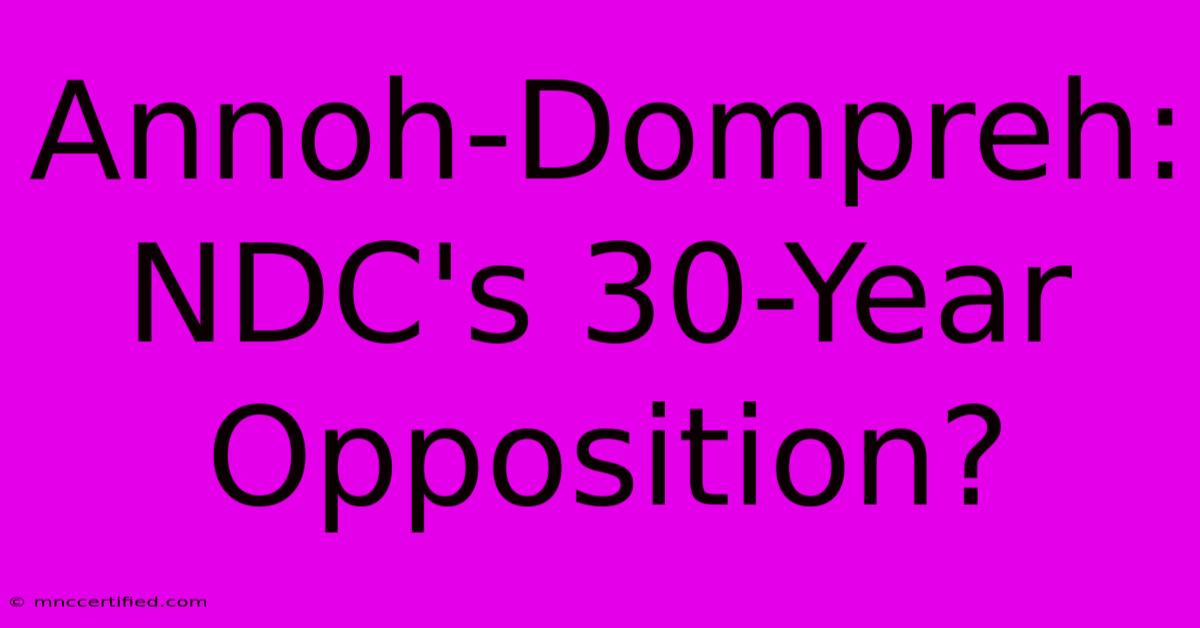Annoh-Dompreh: NDC's 30-Year Opposition?

Table of Contents
Annoh-Dompreh: NDC's 30-Year Opposition? A Deep Dive into Ghana's Political Landscape
Ghana's political landscape is a vibrant tapestry woven with the threads of two dominant parties: the New Patriotic Party (NPP) and the National Democratic Congress (NDC). For nearly three decades, the NDC has occupied the opposition benches for significant periods, sparking debate and analysis. This article delves into this recurring theme, examining the role of prominent figures like NPP's Lawyer Gabby Asare Otchere-Darko and the potential implications of the NDC's prolonged opposition status. We'll explore the factors contributing to this pattern and consider its impact on Ghana's political stability and development.
Understanding the NDC's Opposition History
The NDC, born from the ashes of the Provisional National Defence Council (PNDC), has enjoyed periods of power since its inception. However, its time in opposition has been equally substantial, leading many to question the party's strategies and effectiveness. This prolonged period out of power has fueled discussions about internal dynamics, electoral strategies, and the broader socio-political context in Ghana.
Key Factors Contributing to NDC's Opposition Stint:
- Electoral Dynamics: Analyzing past election results reveals fluctuating voter preferences and the impact of swing voters. Understanding the demographic shifts and the influence of key electoral constituencies is crucial in deciphering the NDC's electoral performance.
- Party Leadership and Internal Conflicts: Internal divisions within the NDC have, at times, hampered its ability to present a united front and effectively campaign. The selection of flagbearers and the management of internal dissent play a significant role in the party's electoral fortunes.
- Economic Performance and Governance: The Ghanaian electorate's assessment of the incumbent government's economic policies and overall governance significantly influences voting patterns. Analyzing the economic climate during NPP's periods in power and the perception of the NDC's proposed alternatives provides valuable insight.
- The Role of Gabby Asare Otchere-Darko: As a prominent figure within the NPP, Lawyer Gabby Asare Otchere-Darko’s influence on the party's strategies and communication cannot be overlooked. His involvement warrants attention when considering the NPP’s electoral victories and the NDC's opposition role. His commentary and analysis, often shared publicly, offer a perspective crucial to understanding the political landscape.
- Messaging and Communication: The effectiveness of the NDC’s messaging to the Ghanaian populace is a critical factor. Analyzing the party's communication strategies, both during and between elections, can help determine areas for improvement.
The Annoh-Dompreh Factor: A Case Study
While not directly causal, the actions and pronouncements of prominent NPP figures like Hon. Alexander Kwamina Afenyo-Markin and especially the Majority Leader, Hon. Osei Kyei-Mensah-Bonsu, offer valuable insight into the NPP's political strategy and the prevailing political dynamics. Understanding their perspective enhances the overall analysis. Analyzing their statements and policies sheds light on the broader political environment and its impact on the NDC.
Long-Term Implications of Prolonged Opposition
The implications of the NDC’s repeated time in opposition are far-reaching. This includes:
- Impact on Policy Development: Prolonged opposition can hinder a party's ability to fully shape national policy, potentially leading to a disconnect between the party's vision and the needs of the people.
- Party Renewal and Rebranding: Periods of opposition can serve as a catalyst for introspection and reform. The NDC must critically evaluate its strategies and adapt to changing political realities to regain popular support.
- Political Stability: While a vibrant opposition is crucial for democracy, prolonged dominance by one party can raise concerns about political stability and the inclusivity of the political system.
Conclusion: The Road Ahead for the NDC
The NDC's recurring opposition status is a complex issue with no easy answers. Understanding the interplay of electoral dynamics, internal party dynamics, economic factors, and the strategies employed by the opposing party is vital. By critically examining these factors, the NDC can chart a course for a more successful future and a more robust and competitive political landscape in Ghana. The party needs a comprehensive strategy encompassing effective communication, internal cohesion, and a clear policy platform that resonates with the Ghanaian electorate. Only then can they meaningfully challenge the NPP's dominance and break the cycle of prolonged opposition. This requires a fundamental reassessment of their strategies and a commitment to addressing the underlying issues that have contributed to their current predicament.

Thank you for visiting our website wich cover about Annoh-Dompreh: NDC's 30-Year Opposition?. We hope the information provided has been useful to you. Feel free to contact us if you have any questions or need further assistance. See you next time and dont miss to bookmark.
Featured Posts
-
Liga Mx Toluca Vs America Live Stream
Dec 01, 2024
-
Recruiting Photos Fsu Vs Florida Game
Dec 01, 2024
-
1990 Upper Deck Barry Bonds
Dec 01, 2024
-
Live Updates Florida Vs Florida State
Dec 01, 2024
-
Where To Stream Vols Vs Vanderbilt Game
Dec 01, 2024